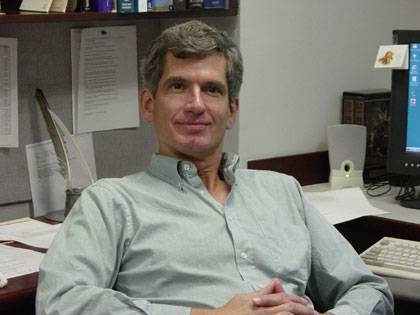
Duke faculty who spend time in the nation's capital generally return to campus with new research interests and what chemistry professor Eric Toone calls "a really cool Rolodex."
But many also bring back something that may come as a surprise during an election season when candidates routinely bash Washington: heightened respect for the thousands of professionals who work in the federal government.
Working alongside fellow scientists, Hill staffers and other federal employees in Washington to serve the public interest "beat all the cynicism out of me," says Toone, who heads the Department of Energy's ARPA-E program to develop new energy technologies. He now expects to return to Duke "with an incredibly vigorous sense that we can and must change the world. I know this sounds kind of corny coming from a 50-year-old man, but it's absolutely how I feel."
H. Jefferson Powell thinks this view is more widespread in Washington than many Americans realize. He returned to the Duke Law faculty in May 2012 after serving as deputy assistant attorney general in the Office of Legal Counsel (OLC) at the U.S. Department of Justice. "What unites us is more important than what divides us," he wrote in a message to Duke Today, which is excerpted at length below:
***
I was a deputy in OLC twice during the Clinton administration, and my experiences there have had a far-reaching impact on my thinking, my teaching and my writing. The public has a (correct) perception that political life in DC is at a distressingly partisan point, and the media are filled with constant accusations that everyone (on all sides and including the lawyers and judges) is acting cynically and for low motives.
My experiences at OLC both in the 90s and recently make me wish strongly that there was some way to communicate to Americans the message that (1) not everything is broken, ugly and partisan, and (2) there is no need why any of our political life has to be what much of it has become.
As a political appointee at OLC, I worked with other politically responsible officials as well as with permanent civil-service lawyers in the Justice Department and across a wide range of government agencies. What strikes me in our current context is how dedicated the vast majority of those people are to doing responsible legal work, in good faith and for the highest of motives -- pro bono publico, for the public good.
Of course I and the other political appointees wanted to see the Obama administration succeed in its policies. That is one reason one wishes to serve in a political position. But the particular contribution of government lawyers, appointees and civil servants alike is to enable the government to function and to pursue the policies that the policymakers prefer but to do so within the law … and to tell the policymakers when necessary that a particular goal or policy cannot be pursued lawfully.
What impresses me about the vast majority of the lawyers with whom I dealt is their conscientious commitment to the law and to providing responsible legal advice. What impresses me about the policymakers is the remarkable extent to which they accept what the lawyers tell them even when they don't like it.
Of course, at times policymakers may shop around for "better" advice. The media have reported some instances of that in this administration as in previous ones and I would not argue that it doesn't happen. But most of the time, even in big ticket, high-pressure situations, the lawyers give responsible advice and the policymakers follow it. That doesn't mean that the lawyers always get their advice right, since no human being is infallible and many legal questions are difficult to answer. What it does mean is that most of the time the legal process within the executive branch of our government is working as it should, and as any citizen, regardless of political affiliation, should want it to work.
I should add, just to be clear, that I don't mean any of what I have written to suggest that this is true only under Democratic administrations: I hope and believe that I would say the same thing if I were Republican and had served under Republican presidents. Furthermore, I certainly don't think I'm talking about something that only lawyers can do. If the government's lawyers can act in responsible and public-regarding ways in doing their jobs, I see no reason why politicians can't do the same. Not that the politicians won't act politically (that is silly) but in their political arena I believe they can act in good faith, assuming good faith in their opponents and keeping in view the fact that what unites us is more important than what divides us. Duke's own Ted Kaufman provided a wonderful example when he served in the U.S. Senate a couple of years ago.
I wish I had a good anecdote to illustrate all this, but the best ones all concern matters that I am not free to talk about. The closest I can come to something interesting and important I can only indicate obliquely. During last summer's debt ceiling crisis, several very distinguished academics published op-ed columns announcing that the whole crisis could be resolved by the president simply exercising some constitutional power of his own (these distinguished scholars didn't agree on which power) that would enable him to ignore the act of Congress that imposes a debt ceiling.
If that idea had been credible as a legal matter, it would have been enormously attractive to policymakers -- whether actually to act on the idea or just to use it as a means of pushing Congress. But the administration did not embrace any of these magic fixes (I mean the sarcasm) and you might well assume that at least part of the reason is that the administration's lawyers told the policymakers that the op-eds were not responsible legal arguments.